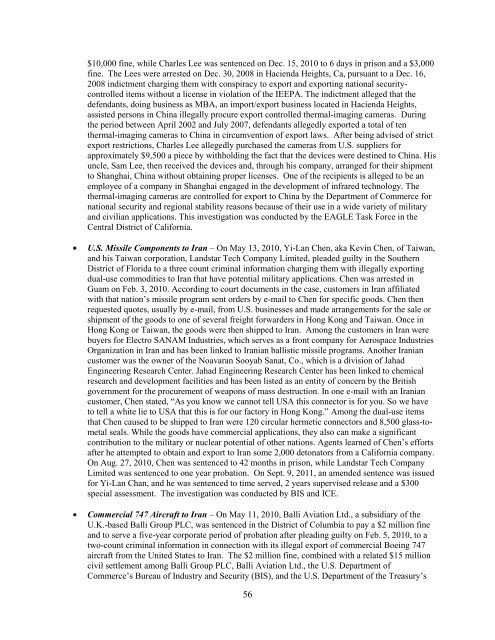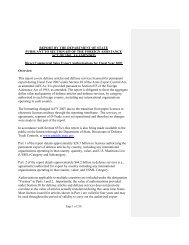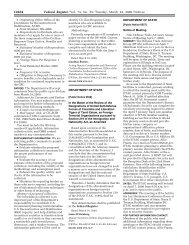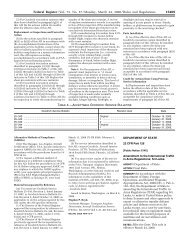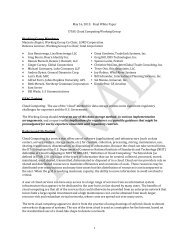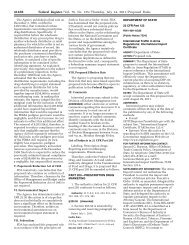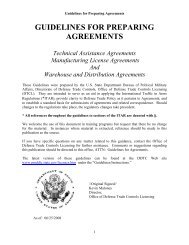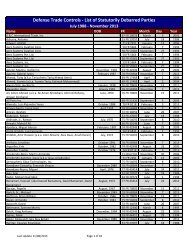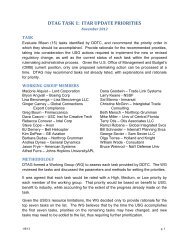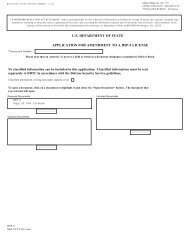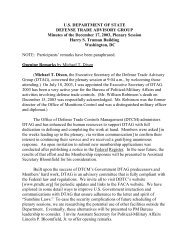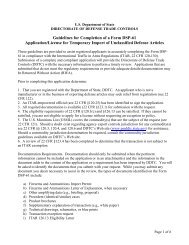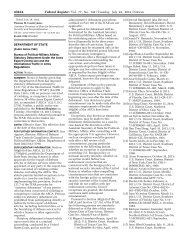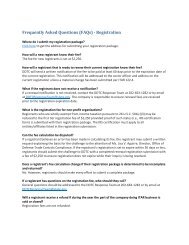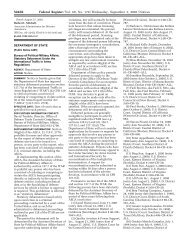Major Export Enforcement Cases - Directorate of Defense Trade ...
Major Export Enforcement Cases - Directorate of Defense Trade ...
Major Export Enforcement Cases - Directorate of Defense Trade ...
Create successful ePaper yourself
Turn your PDF publications into a flip-book with our unique Google optimized e-Paper software.
$10,000 fine, while Charles Lee was sentenced on Dec. 15, 2010 to 6 days in prison and a $3,000<br />
fine. The Lees were arrested on Dec. 30, 2008 in Hacienda Heights, Ca, pursuant to a Dec. 16,<br />
2008 indictment charging them with conspiracy to export and exporting national securitycontrolled<br />
items without a license in violation <strong>of</strong> the IEEPA. The indictment alleged that the<br />
defendants, doing business as MBA, an import/export business located in Hacienda Heights,<br />
assisted persons in China illegally procure export controlled thermal-imaging cameras. During<br />
the period between April 2002 and July 2007, defendants allegedly exported a total <strong>of</strong> ten<br />
thermal-imaging cameras to China in circumvention <strong>of</strong> export laws. After being advised <strong>of</strong> strict<br />
export restrictions, Charles Lee allegedly purchased the cameras from U.S. suppliers for<br />
approximately $9,500 a piece by withholding the fact that the devices were destined to China. His<br />
uncle, Sam Lee, then received the devices and, through his company, arranged for their shipment<br />
to Shanghai, China without obtaining proper licenses. One <strong>of</strong> the recipients is alleged to be an<br />
employee <strong>of</strong> a company in Shanghai engaged in the development <strong>of</strong> infrared technology. The<br />
thermal-imaging cameras are controlled for export to China by the Department <strong>of</strong> Commerce for<br />
national security and regional stability reasons because <strong>of</strong> their use in a wide variety <strong>of</strong> military<br />
and civilian applications. This investigation was conducted by the EAGLE Task Force in the<br />
Central District <strong>of</strong> California.<br />
U.S. Missile Components to Iran – On May 13, 2010, Yi-Lan Chen, aka Kevin Chen, <strong>of</strong> Taiwan,<br />
and his Taiwan corporation, Landstar Tech Company Limited, pleaded guilty in the Southern<br />
District <strong>of</strong> Florida to a three count criminal information charging them with illegally exporting<br />
dual-use commodities to Iran that have potential military applications. Chen was arrested in<br />
Guam on Feb. 3, 2010. According to court documents in the case, customers in Iran affiliated<br />
with that nation’s missile program sent orders by e-mail to Chen for specific goods. Chen then<br />
requested quotes, usually by e-mail, from U.S. businesses and made arrangements for the sale or<br />
shipment <strong>of</strong> the goods to one <strong>of</strong> several freight forwarders in Hong Kong and Taiwan. Once in<br />
Hong Kong or Taiwan, the goods were then shipped to Iran. Among the customers in Iran were<br />
buyers for Electro SANAM Industries, which serves as a front company for Aerospace Industries<br />
Organization in Iran and has been linked to Iranian ballistic missile programs. Another Iranian<br />
customer was the owner <strong>of</strong> the Noavaran Sooyab Sanat, Co., which is a division <strong>of</strong> Jahad<br />
Engineering Research Center. Jahad Engineering Research Center has been linked to chemical<br />
research and development facilities and has been listed as an entity <strong>of</strong> concern by the British<br />
government for the procurement <strong>of</strong> weapons <strong>of</strong> mass destruction. In one e-mail with an Iranian<br />
customer, Chen stated, “As you know we cannot tell USA this connector is for you. So we have<br />
to tell a white lie to USA that this is for our factory in Hong Kong.” Among the dual-use items<br />
that Chen caused to be shipped to Iran were 120 circular hermetic connectors and 8,500 glass-to-<br />
metal seals. While the goods have commercial applications, they also can make a significant<br />
contribution to the military or nuclear potential <strong>of</strong> other nations. Agents learned <strong>of</strong> Chen’s efforts<br />
after he attempted to obtain and export to Iran some 2,000 detonators from a California company.<br />
On Aug. 27, 2010, Chen was sentenced to 42 months in prison, while Landstar Tech Company<br />
Limited was sentenced to one year probation. On Sept. 9, 2011, an amended sentence was issued<br />
for Yi-Lan Chan, and he was sentenced to time served, 2 years supervised release and a $300<br />
special assessment. The investigation was conducted by BIS and ICE.<br />
Commercial 747 Aircraft to Iran – On May 11, 2010, Balli Aviation Ltd., a subsidiary <strong>of</strong> the<br />
U.K.-based Balli Group PLC, was sentenced in the District <strong>of</strong> Columbia to pay a $2 million fine<br />
and to serve a five-year corporate period <strong>of</strong> probation after pleading guilty on Feb. 5, 2010, to a<br />
two-count criminal information in connection with its illegal export <strong>of</strong> commercial Boeing 747<br />
aircraft from the United States to Iran. The $2 million fine, combined with a related $15 million<br />
civil settlement among Balli Group PLC, Balli Aviation Ltd., the U.S. Department <strong>of</strong><br />
Commerce’s Bureau <strong>of</strong> Industry and Security (BIS), and the U.S. Department <strong>of</strong> the Treasury’s<br />
56


